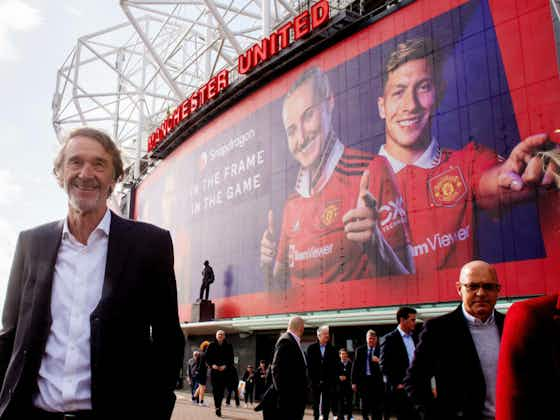EPL Index
·17 May 2025
Ratcliffe’s Wealth Drops as Man United Pursue £2bn Stadium Vision

In partnership with
Yahoo sportsEPL Index
·17 May 2025

Sir Jim Ratcliffe, Manchester United co-owner and head of the petrochemical giant Ineos, has seen his personal fortune nosedive by £6.473bn in the last year—down from £23.519bn to £17.046bn, according to The Sunday Times Rich List. Once ranked fourth among the UK’s 350 wealthiest individuals, the 72-year-old now sits seventh.
The timing of Ratcliffe’s financial downturn coincides sharply with a period of turbulence and transformation at Old Trafford. In February 2024, Ineos acquired a 27.7% stake in United in a deal valued at £1.25bn ($1.6bn), handing the company control of football operations. That figure was eye-watering, even by Premier League standards, and now looks starker in the shadow of personal financial losses.
Since arriving at Manchester United, Ratcliffe has taken an axe to the status quo. Ticket prices have risen. Two rounds of redundancies have taken place. The British billionaire has not shied away from explaining his actions, telling the BBC in a wide-ranging March interview that the club would have “run out of cash by the end of this year” had he not made “unpopular” decisions.

Photo IMAGO
Despite these austerity measures, United have revealed plans to build an “iconic” new £2bn, 100,000-seater stadium close to the current Old Trafford site. This juxtaposition of belt-tightening and grandeur has drawn understandable scrutiny from fans and financial observers alike.
Ratcliffe insists that financial challenges at Ineos—triggered by pressures within Europe’s chemicals industry, high energy taxes, and what he termed “the deindustrialisation of Europe”—will not affect Manchester United. “Ineos is in a good place today but not in as good a place as it was three or four years ago,” he told BBC Sports Editor Dan Roan. “Europe has become a very difficult place to do business for industrial companies because energy prices now in Europe are five times America, which is where a lot of our competition is.”
Ineos’s recent actions, however, suggest otherwise. The company walked away early from its New Zealand Rugby sponsorship in February and parted ways with four-time Olympic champion Ben Ainslie after backing the Britannia America’s Cup sailing team since 2018. “Cost-saving measures” were cited, with the firm pointing to “high energy taxes and extreme carbon taxes.”
These strategic withdrawals have only intensified the spotlight on Ratcliffe’s commitment and capacity to continue investing in Manchester United, especially as the club finds itself languishing in 16th place in the Premier League.
With only two games left this season, their best hope for silverware—and next season’s Champions League berth—rests on victory over Tottenham in the Europa League final on Wednesday.
While Ratcliffe’s numbers have slumped, some of Britain’s finest athletes have seen their wealth rise. Rory McIlroy leads the Sunday Times’ 40 under 40 list among athletes, increasing his fortune from £225m to £260m after completing a career Grand Slam at the Masters. Boxer Anthony Joshua (£195m), retired tennis star Andy Murray (£110m), and England football captain Harry Kane (£100m) have all seen notable increases as well.
The contrast between individual sporting success and United’s collective uncertainty could not be more pronounced.
United fans are rightly concerned. The optics are difficult to digest: a billionaire’s net worth tumbles by billions, redundancies sweep through the club, ticket prices soar—and yet a £2bn stadium is somehow deemed feasible. It’s like buying a Rolls-Royce while laying off your staff and claiming you’re skint.
Supporters may understand the need for tough financial decisions, but transparency is vital. “Unpopular” choices don’t sit well unless matched with visible, consistent progress. United’s on-pitch struggles, sitting 16th with just days left in the league season, make the financial turmoil feel even more pressing.
The faith Ratcliffe places in separating Ineos’ financial state from Manchester United’s operations is admirable, but fans won’t be satisfied with platitudes. They want results. A Europa League final win over Tottenham may provide momentary relief—but the long-term vision remains hazy.
Until there’s a clear and credible strategy that explains how cost-cutting coexists with a £2bn stadium dream, the concern among United’s global fanbase will continue to grow.


Live




Live




Live




Live




Live

















































